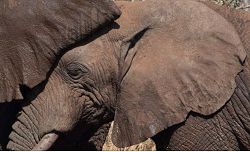#madeatreading: Saving wildlife with the latest science
Wednesday, 19 June 2019

Protecting endangered leopards, supporting pollinators that underpin the world’s food production and helping wildlife survive the threat of climate change are among pioneering research projects being led by University scientists.
Natural science researchers at the University are investigating how to protect animals and humans around the world from environmental threats to their existence.
This is just one area of our world-leading environmental science research, which is being highlighted all this week as part of the University’s #madeatreading campaign.
The week will culminate with ‘Show Your Stripes Day’ on Friday 21 June, during which members of the public can help raise awareness of climate change by sharing a graphic showing how temperatures around the world have risen since 1850. People can visit showyourstripes.info to generate a climate stripes graphics tailored to where they live and share it on the day in support of climate science.
Dr Phil Newton, Research Dean, said: “We are proud to be at the forefront of efforts to identify threats to wildlife worldwide and prevent the species we love from disappearing forever. These animals are a key part of the planet’s identity and our researchers are helping give them the chance to thrive long into the future.”
We were ranked as the number one UK university for citations in environmental and ecological research by InCites. Its research is helping to:
- Protect rare leopards in South Africa, which are threatened by poaching and habitat loss. Zoologist Dr Tara Pirie is monitoring the big cats in reserves, including the exceptionally rare strawberry leopard, to learn about their behaviour in the wild and identify the best methods of conservation. This has helped authorities in the country to reduce the conflict between the leopards and humans.
- Identify action to prevent a decline in pollinators and reduce threats caused by things like intensive farming and climate change. This is important because pollinators are responsible for more than 30% of global crop production. Professor Simon Potts has written reports for the United Nations on preventing a global crisis and co-founded the World Bee Project, which is using artificial intelligence to learn more about healthy habitats.
- Combat threats to global biodiversity. Professor Tom Oliver is studying the impact land use and climate change is having on wildlife like birds and butterflies, in order to support environmental decision-making.
- Better conserve elephants in Africa. PhD researcher Vicky Boult has visited Africa to study how the continent’s growing population has impacted endangered elephants, yet how some conservation areas are actually considered to have too many elephants or present a threat to other species.
- Follow the University’s campaign activities throughout the week on Twitter, Facebook and Instagram, and join the discussion using the hashtag #madeatreading
Follow the University’s campaign activities throughout the week on Twitter, Facebook and Instagram, and join the discussion using the hashtag #madeatreading
